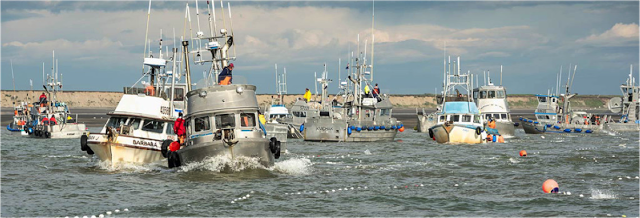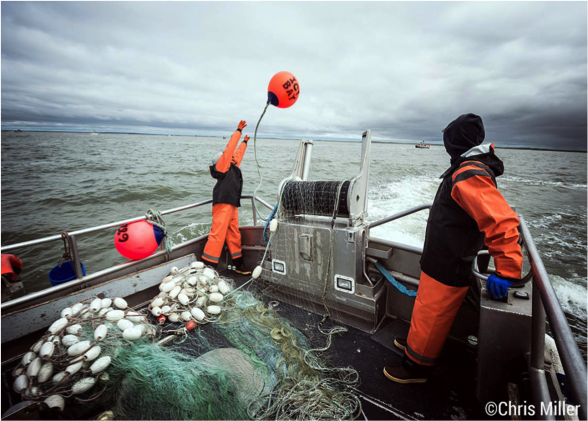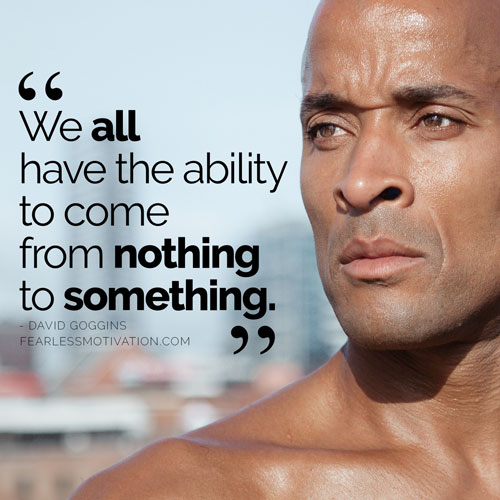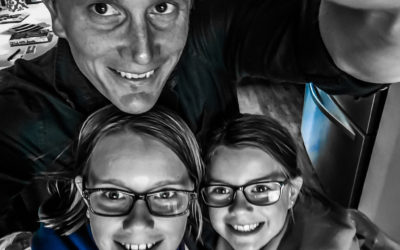My Deadliest Catch

How fishing in Alaska influenced the person I am today
You might have seen that show on the Discovery Channel called Deadliest Catch. It takes place in the mass of water between Russia and western Alaska called the Bering Sea. The show features crab boat captains and their crews working these perilous waters.
Many of you know that I grew up in Alaska. Some of my close friends growing up are still there today running fishing boats. It’s a dangerous profession. Every year fishing boats capsize and fishermen lose their lives in accidents.
My father was once saved by a U.S. Coast Guard helicopter when the boat he was working lost its engines and almost sank.
I never worked on a crab boat in the Bering Sea. Those guys are nuts. But I did work one summer on a fishing boat in Bristol Bay, which is in the Bering Sea but closer to shore. Instead of crab, we fished for salmon. Bristol Bay is home to the world’s largest sockeye salmon fishery.
The fishery in Bristol Bay should have its own TV show. My summer there was like going back in time to the Wild West.
There are four reasons why fishing in Bristol Bay, Alaska gets so crazy:
1. There are no docks or ports, so to get to shore you literally have to beach your boat at high tide and be ready to leave when the tide goes out. There is no infrastructure, no towns to speak of—you are in the middle of nowhere.
2. Because the native people still fish those waters, Fish and Game implemented rules that boats cannot be bigger than 32 feet. For the past few decades, boats have been constructed specifically for this fishery. They’re 32 feet long, but really wide, to allow as much deck space as possible. They’re built like tanks—metal boats that can withstand collisions, accidental groundings, and the harsh conditions of Alaska.
3. Fish and Game regulates this fishery by designating lines in the sea past which boats cannot fish. They have boats that sit outside this designated line to make sure fishermen don’t break the rule. (I’ll come back to this in a minute.)
4. The whole bay is remarkably shallow. You often can’t see land, it’s so big—but much of the bay is less than 15 feet deep. Which means you can’t get big ships in there, and you have to be careful how you operate your vessel so you don’t run aground.
There were three of us onboard that vessel: the captain and two deckhands. I was offered the job after my first year at college. Since I spent most of my savings to pay for my first year of school, I was ecstatic to get the invitation. Deckhands often could make $20,000 or more in two months fishing in Bristol Bay. That was a lot of money. I didn’t really care what I had to do—I knew I couldn’t say no.
The other deckhand was named Karl, whom I knew well since he was on the wrestling team with me in high school. He was two years younger than I was, but he grew up in a fishing family. Karl had been commercial fishing since he was six years old. He was incredibly tough, fast, and skilled. I’m no slouch, but Karl was amazing. He could operate at a whole different speed than I could, even when I was giving everything I had. His stamina was unbelievable, he just kept going. But most importantly Karl has a great sense of humor and he was my friend.
 |
| This is Karl almost 20 years ago, he was (is) tough as nails. I learned a lot from him. Yep, that’s an Alaskan Salmon! |
“The captain was a younger guy, maybe late 30s. And on drugs”
The captain was a younger guy, maybe late 30s. And on drugs. This was his first year as a captain in Bristol Bay. He had taken a huge financial risk by purchasing a boat and buying into the fishery. What we deckhands didn’t know was that he was also in pain. A lot of pain. He had blown a blood vessel in his brain while lifting weights, and therefore had horrible headaches which he self-medicated with hardcore painkillers. (More about this later.)
We flew in to this small Alaskan village where the boat was located. The first task the captain gave us was to lash a bunch of old tires around the boat. Initially I thought it was to protect the sides of the boat when we docked or tied up to another vessel. But I soon realized there was some other purpose, because he had us cover every inch of the side rails in tires. So not only was this vessel a floating tank, it was a floating tank with an extra layer of protection.
We soon set out for the fishing grounds. We fished with a gill net, which is basically a net that lets out off the back of the boat. One side of the net was weighted down, and the other side had floats so it didn’t sink, thereby creating this wall in the ocean about ten feet deep. Salmon would swim into the wall and get part of the way through the holes, and then the net would get stuck in their gills so they couldn’t escape. It was our job as deckhands to haul the net back into the boat and free the salmon with our hands so they would fall and pile up on the deck. On a good haul, there would be no place to stand as salmon would literally be flapping around every inch of the back deck.
“The year I went up to Bristol Bay, something terrible happened.”
The year I got my lucky break to fish in Bristol Bay, Alaska, salmon were at a 50 year low—something almost unheard of, where the weather or currents in the Pacific Ocean led to a phenomenon that kept most of the salmon from coming in.
This was devastating for all the fishermen, especially the rookies like my captain who were just learning the ropes of the fishery. These fishermen got desperate—although, I’m convinced, none as desperate as my captain. Initially, he didn’t realize there was a salmon shortage. My captain kept looking for salmon and got increasingly pissed off the more we struggled to find them.
This led to some terrible verbal abuse as he sat behind the wheel of the ship and took out his frustrations on us deckhands—or rather, on me. Because I wasn’t as fast or as skilled as my fellow deckhand (who was, let’s face it, likely the best deckhand in the entire fishery), my captain literally stared at me all day and criticized every movement I made. Since he was high on pain medicine or because he was an A-hole, he had no filter and didn’t appreciate that I was working my ass off for him.
There was nothing I could do about it.
I was stuck on the boat.
I couldn’t quit, because we never went to shore.
He also stopped buying food.
When you turn in your fish for the day, you tie along a larger vessel that takes your salmon. They also have “stores” which are basically grocery items you can purchase. But since my captain wasn’t making any money, he didn’t buy any food. None. All we had on board was a big bag of white rice and the salmon we caught each day. Which meant all we ate for two months was salmon and rice. And we only ate once a day—the captain, being high on pain medicine, was never hungry. I learned that salmon and rice, once a day, is a great diet for weight loss.
As the days went on, things only got worse.
As the days went on, things only got worse. My captain grew more desperate and mean, and he took more risks with the boat. Remember the line in the ocean enforced by Fish and Game? That’s where most of the fishing boats gathered.
They jockeyed for position, so they could make a run down the line with their gill nets to capture fish as they swam up the bay. However, boats that accidentally (or intentionally) went over the line were slapped with huge fines, often well over $10,000. So the jockeying on this line was intense and aggressive—hence the extra armor around our vessel. Others had the same protection, and we needed it, as it became a huge game of bumper boats on the ocean.
We could be lined up to make our run on the line, and a boat would come at us (full speed) and intentionally ram us out of position. We deckhands would be busy working the nets, and the captain would scream that we were about to be hit, so we could hold on to something in order to avoid flying out of the boat.
 |
| Fishing Boats in Bristol Bay fighting for position. |
It was like the Wild West. I saw guys with shotguns threaten other captains from the bows of their boats. I saw boats band together like gangs and use their numbers to block other vessels from approaching the line. This, of course, sent my captain’s anger through the roof, which led to him ramming boats for no reason and having other boats force us over the line, which led to us getting fined, and more screaming frustration directed at me.
I couldn’t believe the Coast Guard and Fish and Game would allow such crazy behavior, but they did. They just sat there and watched for someone to go over the line so they could rush in and fine them.
Some days we fished when everyone else went for cover. The wind blew up waves in that shallow bay that were more ideal for surfing than for boating. The waves got so big and tall that our flat-bottom boat slid down them like a surfboard and hit the ocean floor hard. I remember holding on for life in the back of the boat, calculating how I would get to the other end to retrieve my survival suit when our captain inevitably sank or rolled the boat with his bad judgment.
I survived—just barely
I wondered if I would eventually crack under the constant criticism and lash back at my captain. I was convinced that would lead to one of us being murdered aboard the ship. Every day on that boat I daydreamed about what I wanted to say to that jerk. Those daydreams may have been the only thing that kept me from actually doing it.
After six or seven weeks, my 160 pound frame was down well below 140. The captain, finally feeling defeated, said he couldn’t pay me, especially if he kept both of us deckhands on board. So he dropped me off on shore, and I caught a floatplane out of there. I remember getting to Anchorage, sleeping in the airport, reeking to high heaven, I’m sure. I had a ticket to get home, but I was leaving two weeks early.
“I almost broke down right there in front of everyone.”
The next morning I checked in for my flight. The gal at Alaska Airlines was almost finished checking me in when she said, “Oh! I need to charge you a $35 change fee for this ticket.” I looked at her with disbelief. I didn’t have any money with me. (This was before I had credit cards and bank accounts.) I hadn’t eaten anything except airline peanuts in the past 24 hours. She said she couldn’t allow me to fly without paying the fee. I almost broke down right there in front of everyone. I felt so close to escaping the nightmare and finally going home.
I found a payphone and tried calling my parents, but they were both at an education seminar in California. I tried calling some family friends but couldn’t reach anybody.
I went back to my chair to figure out what in hell I was going to do, trying not to think about how hungry I was, when an idea popped into my head. The gal from the airline had nearly finished checking me in when she remembered she was supposed to charge me for the change ticket. I wondered if another check-in agent would overlook it like she almost did. There were five airline staff checking people in. So I decided to change my clothes, put on my hat, and get back in line. It looked like I was queued up to get the same gal as last time, so I let some people go ahead of me. I ultimately managed to get another agent. I hid my face the best I could from the gal two computers down.
It worked. This agent didn’t ask me to pay for anything and gave me a boarding ticket. I practically ripped it from his hands and ran to my gate. I was going home. (The airline food that day was the best I’ve ever tasted.)
The funny thing is, I don’t regret taking that job. I ended up losing money, as my ticket to get up to Bristol Bay cost more than I was paid. I was certainly relieved to get off that boat, to not work for that jerk anymore, to go home, to nurse my injured body back to health. But I look at that experience the way a runner thinks about his first marathon—the race may have almost killed him, but he finished it. He survived it.
“Lots of things can get under my skin. However, no matter the scenario, it’s never as bad as ANY day on that boat.”
I think about that job often when I’m going through a tough situation. Whether I’m dealing with people who are being total jerks, or going through a difficult situation at work or while traveling. Lots of things can get under my skin. However, no matter the scenario, it’s never as bad as ANY day on that boat. That experience on that boat made me more resilient to pressure and difficult situations.I don’t know if I ever thanked Karl for having my back up there. I guess it was one of those unspoken acts of friendship. No matter how tough and resilient you are, having someone in your life who helps you stay sane, who makes you laugh during difficult situations is priceless.
We’ve all had tough experiences. I’m sure you can think of many you went through. Do you believe they helped shape the person you are now? Did it make you more resilient? That doesn’t mean you want to repeat it or recommend it to anybody else—but it is part of your identity. I guess that’s why I share my stories with you. They are part of my identity, and help explain how I’m wired and how I think.
Plus, it’s fun for me to share my stories. Like how I had lunch with famous actress Penelope Cruz. Or how I got to play a real-life Indiana Jones in the jungles of the South Pacific. But you’ll have to wait for a future blog to hear those.






0 Comments